Micro-cheating, like tiny needles poking at your heart, can cause pain and strain in a relationship. It is a slippery slope that involves subtle actions like winking at a stranger, flirting with exes, or even hiding the cell phone at the dinner table for no apparent reason (well, there might be a reason). These seemingly harmless behaviors can escalate, leading to relationship arguments and in some cases, the end of a relationship.
Therefore, it is crucial to recognize the early signs of micro-cheating and how to deal with them. It may start innocently with an online conversation, but if left unchecked, it could snowball into an extramarital affair. Unlike traditional infidelity, where a husband is sleeping with another woman for instance, this type of emotional cheating is harder to spot, making it trickier for those involved.
What Is Micro-cheating In A Relationship?
Table of Contents
What is micro-cheating in a relationship? Research by the University of Baguio states, “Micro-cheating is described as trivial behaviors or a small act of infidelity. It also involves the use of technology or the internet, specifically social media like Facebook, Instagram, and online dating applications (e.g., Bumble and Tinder). The result also shows that micro-cheating can be a warning sign that such trivial behaviors can lead to full-blown infidelity. Moreover, micro-cheating can be observed as crossing the boundaries of friendship, having hidden or implicit desires, and using technology as a medium … (The) researchers were able to particularly present a description of micro-cheating which are the actions that come close to the mutually established boundaries of a relationship.”
Now, imagine you’re out on a lovely dinner date. Your boyfriend is constantly staring at someone else lustfully, yet refraining from crossing certain boundaries like kissing. This is an example of micro-cheating – the subtle dance on the fine line between fidelity and infidelity. It involves those tiny acts that might not be considered full-blown cheating but can still raise eyebrows.
It’s like a warning sign in a relationship that one partner might not be as committed as the other. They might keep their options open, fueled by a desire to explore what’s out there. It’s like they’re ‘almost’ cheating, but not quite. However, it can slowly chip away at the foundation of trust, leaving room for doubt and insecurity in a relationship.
A Reddit user explains this micro-cheating meaning, “Let’s say you’re in a relationship with A. Dating for years, in a real relationship. You go out with friends and someone approaches you, named B. You and B hit it off, talk all night and then exchange numbers. You didn’t make out, you didn’t hook up but you guys keep in contact. Text every morning, all day, etc. You’re also hiding this new “whatever” from A. It’s like the internet’s way of saying emotional cheating without any physical touching.”
Another user says, “Cheating rarely is an action one time. Usually, there are little steps that progress toward the event of cheating. If you have taken these steps but haven’t crossed the threshold of what you consider actually cheating (physical contact or emotional intimacy), then it falls into this definition. It’s boundaries that shouldn’t be crossed without realizing this could aid the progression to cheating.”
Related Reading: 3 Day Rule After An Argument – Meaning, How And When To Apply, Pros And Cons
Micro-cheating Examples
As we said earlier, unlike blatant cheating, micro-cheating is not always easy to identify. These small yet significant actions can include flirtatious interactions, emotional intimacy with someone outside the relationship, or keeping certain communications hidden from a partner.
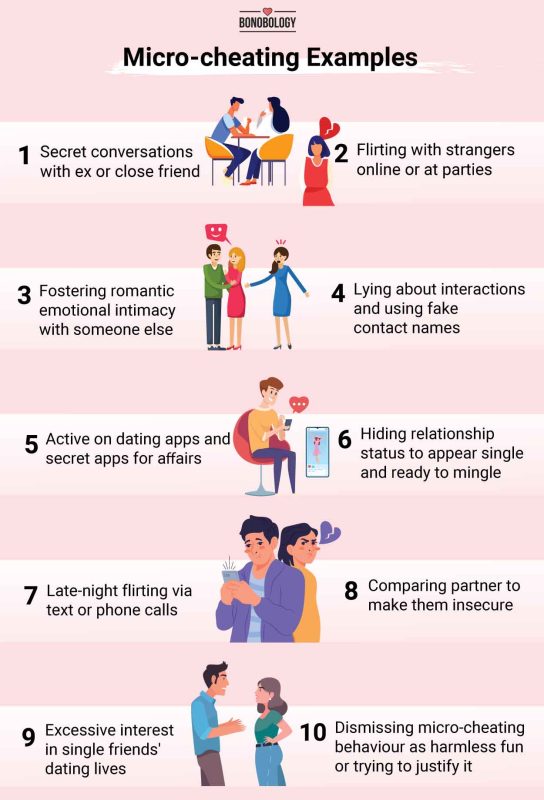
To shed light on this slippery slope, here are some micro-cheating examples that can potentially create an unhealthy relationship:
- You hide your ex or close friend: You maintain secret conversations with your ex or a close friend without telling your partner about it. You may also regularly meet up with them
- You flirt online with strangers: Emotional cheating texting examples or signs he is micro-cheating might include flirty conversations with strangers on social media, liking and commenting on their posts in a way that goes beyond friendly interaction
- You’re too emotionally intimate with someone: You share intimate details and personal feelings with someone, creating the scope for emotional cheating
- You lie about your interactions: You save contacts with fake names (for example, your ex Sandra is apparently the plumber who calls you every night?). It’s risky when a partner lies to the other about their communication with certain individuals
- You’re swiping on dating apps: Despite being in a committed monogamous relationship, you’re active on dating apps. When you’re swiping and chatting with others on dating websites and your partner doesn’t know about it, it’s one of the obvious micro-cheating texting examples
- You make extra efforts for someone: You go out of your way and cross the line to impress a friend, especially while keeping secrets from your partner
- You divulge private details of your relationship: You turn to someone for emotional support outside your shared group or old friends to discuss private relationship issues. In some cases, you contact your ex for comfort during challenging times in your current relationship
- Your profile is deceptive: You have a profile picture that makes people feel safe accepting friend requests from you and they also do not get the idea that you are in a committed relationship
- You flirt at parties: You flirt with different people and cross the boundary, perhaps even when your partner is present, and this doesn’t come across as playful banter
- You are easily tempted: When you find others attractive in a relationship, you want a selfie with them or wish to meet them later. This happens often and you also end up taking their contact details and planning a meet-up (read: “friendly” date)
- You share kinky, private jokes: You have inside jokes with another person, mostly flirty jokes, that your partner is unaware of. This unique emotional bond fosters a sense of sexual intimacy
- You hide your relationship from the world: You avoid mentioning your partner or relationship status in certain social settings or with certain people, and sometimes even to your loved ones, indicating a desire to appear single and, of course, ready to mingle
- You maintain secret messaging apps for online affairs: Signs he is micro-cheating might include the hidden usage of private messaging apps for couples for secret chatting
- You’re overly defensive about a friendship: You become defensive or evasive when your partner questions your relationship with a certain individual
- You fantasize about someone constantly: You always daydream about being with someone else romantically or intimately. You may even spend time replaying past romantic experiences with your exes in your mind
- You send late-night messages to someone: You engage in borderline flirting via late-night conversations with someone outside your relationship
- You compare your partner: You make comparisons between your partner and others, whether it’s their looks, achievements, or personality traits. This may make your partner feel inadequate, suffer from low self-esteem in the relationship, and indicate that you desire someone else
- Excessive interest in your single friends’ dating lives: You are overly curious about the dating lives of your single friends, hinting at a desire for a romantic experience
- You stalk someone online: You spend time obsessively monitoring the online activities of someone you find attractive on social media
- You deny the impact of your actions: You dismiss your micro-cheating behavior as harmless fun, try to justify it and downplay its significance, refusing to acknowledge its impact on the relationship and your partner’s mental health
Related Reading: The 7 Types Of Cheaters – And Why They Cheat
Signs Of Micro-cheating In A Relationship
Understanding the signs of micro-cheating in a relationship can be incredibly helpful for healing the bond you share with your partner and for your own emotional safety. Micro-cheating involves subtle actions and behaviors that, when overlooked, can lead to significant trust issues, breakups, and divorces. Recognizing these signs early on allows you to address any potential issues, set clear boundaries, reinforce trust, and take necessary decisions. Here are 7 common signs of micro-cheating:
1. They are suspiciously protective of their phone
Have you noticed something really fishy with your partner’s phone habits? If that’s the case, there might be something going on because this is how cheaters hide their tracks. Yes, your partner may find others attractive in a relationship and is indulging in micro-cheating behavior. So here are a few micro-cheating texting examples to look out for when your husband hides phones:
- When you’re hanging out with your significant other, their eyes are glued to their phone like it’s their new BFF. They can’t seem to put it down, even for a moment
- And it doesn’t end there – They carry their phone everywhere, even to the bathroom! It’s like they’re guarding a precious secret, and you’re left feeling a bit suspicious
- They snatch their phone away or hide the screen whenever a notification pops up
2. They follow their ex on social media (and there’s more to the story)
What are the signs of micro-cheating? A Reddit user says, “My boyfriend (m26) and I (f23) have been together for almost a year now. I found out that he has been searching for and looking up his ex and other girls on Google and on all kinds of social media a lot, almost every day. Especially his ex-girlfriend. This makes me very uncomfortable and worried about our relationship. He tells me he loves me and is generally very affectionate and often talks about us moving in together and having a future together but I’ve kind of lost my trust in him because of this, so I doubt everything he says.
“He and his ex broke up a couple of years ago simply because they fell out of love and grew apart and they had been together for about six years, so it was a “good” breakup according to him. I can understand being curious and looking up your ex now and then but this is a very frequent behavior of his. I feel like I’m not enough for him and that he’s not satisfied in our relationship. I really don’t know how I should deal with this or what to think about it.”

Sure, having an understanding and being on good terms with exes is one thing, but when your partner hides their social media interactions from you, it’s time to be cautious. While some may not believe in blocking their exes, it becomes a whole different story when your partner seems a little too invested in their ex’s social life. This type of social media micro-cheating is a real thing and it can wreak havoc on a relationship. Here are the red flags to watch out for:
- Your partner is constantly keeping tabs on their ex’s life updates – Vacations, selfies, dating life
- They’re leaving lovey-dovey comments on their ex’s pictures as if they’re still single
- Your partner shows heightened emotional reactions, such as jealousy or anger, when their ex posts something on social media with a potential date. This could indicate lingering feelings or unresolved issues between them
- They are engaging in frequent chats with their ex and trying to hide it from you by deleting messages or using encrypted messaging apps to keep their interactions private
3. They bring up their ex-partner in every conversation
When your partner brings up their ex in conversations more than what seems normal, it can create doubt in your mind. While staying friends with an ex is absolutely fine in many cases, knowing every intimate detail months after a breakup can be a cause for concern. It’s essential to have an honest conversation if your partner’s behavior seems overly attached to their past. Watch out for this sign as it could be a subtle form of micro-cheating.
4. Their profiles on dating apps still exist
“Checking what’s out there” on dating sites is not harmless. A Reddit user shares, “I never suspected my partner would cheat, he was always very reassuring, loving, and caring toward me. He put in effort, organized massive events for special days (birthday, anniversary, Christmas). He NEVER made me feel neglected. The weirdest part? We are together every day. It’s actually a coincidence that my cousin told me of an app that lets you check whether your partner is on Tinder or not – She caught her gf on there, and I JOKINGLY used it as well not expecting to find my partner on there.”
She adds, “However, I did and when I confronted him, his excuse was that all men go on it here and there just to browse, but he never spoke to anyone and wasn’t interested in doing so. I am very lost between letting this slip or ending the relationship as he’s always been amazing to me and in the relationship, and this has been our only hiccup. However I’m wondering whether it’s a value difference as I wouldn’t just browse for fun.”
Well, people generally don’t “just browse for fun” on dating websites while being in a happy and committed relationship. However, if you discover your partner’s dating profile is still active, it could be an inappropriate behavior or one of the early signs of cheating in a relationship. It suggests they might still be open to new emotional connections, and your relationship might not be as solid as you thought.
Related Reading: What Is Revenge Cheating? 7 Things To Know
5. They will do anything to avoid attending social events with you
Attending events as a couple is a natural part of many relationships. If you notice your partner always wants to attend them alone, it might raise some concerns. While there are genuine reasons for solo outings, be wary if they consistently decline your company with dubious excuses like “It’s a boring party” or “I’ll only be there for 15 minutes.” They might be hoping to run into someone specific and keep it hidden from you.
If they insist on going alone even after you express interest in joining them, there could be something suspicious going on. It’s not certain they’re trying to woo someone else, but the need for secrecy hints at a desire to flirt or explore other emotional connections. This could be a telltale sign of micro-cheating in a relationship.
6. They are always smiling at their phone – And no, it’s not a dog meme
What are the signs of micro-cheating? When your partner is constantly smiling at their phone in a secretive way, it might be worth paying attention to. A cute or flirty message could be the reason behind that joy. Wait a few times before asking what they’re smiling at to understand the situation. If they show you the text or image, there’s likely nothing to worry about. However, if they repeatedly respond with “nothing” and seem hesitant to share, it might be a sign of micro-cheating on social media.

Olivia (29) from Miami says, “Cheating scenarios can vary widely, and cheating isn’t always as overt as it seems. For example, what is micro-flirting? It involves subtle interactions that might not cross the line into physical cheating. But is seeking attention from others while in a relationship cheating as well? The thing is, according to my past dating experiences, such soft cheating starts with sneaky conversations and your partner seems to always smile at their phones while receiving special attention from someone else. These micro transgressions might seem innocent but trust me, they erode relationship trust over time.”
7. They get defensive and try to gaslight you when you bring up their micro-cheating behavior
One of the most important signs of micro-cheating is intuition. In a healthy relationship, there should be open communication between partners, especially if something repeatedly bothers one of them. So when your partner’s behavior keeps nagging at the back of your mind, it’s only natural to bring it up. A genuine partner, who is not at fault, will be open to sitting down and discussing your concerns, seeking to understand and clarify any suspicions. However, if you notice a shift in their energy and behavior, along with some guilt or hesitation, it might be a sign of unfaithfulness in a relationship.
During this discussion or confrontation, your partner may become overly defensive and fly into a rage. To invalidate your feelings and make you doubt your intuition, they may also use gaslighting statements such as:
- “You’re just being paranoid, there’s nothing going on.”
- “Why are you always trying to find problems where there aren’t any?”
- “I can’t believe you’re making such a big deal out of nothing.”
- “I’m not micro-cheating. You’re just being too sensitive and overreacting.”
- “You must be insecure to even think I would do something like that.”
- “It’s all in your head, I haven’t done anything wrong.”
- “You’re just trying to start a fight for no reason.”
- “You’re just trying to control me by bringing up these baseless accusations.”
- “Stop being so jealous and accusing me of emotional cheating, it’s not attractive.”
- “You’re making up these micro-cheating stories to cause drama in our relationship.”
How To Deal With Micro-cheating
Dealing with micro-cheating in a relationship can be a challenging and emotionally draining process. It’s crucial to approach this sensitive topic with empathy and open communication. By addressing the issue head-on and working together, it can be easier to navigate this situation. Here are some ways to deal with micro-cheating and strengthen your relationship (and yes, if needed, be brave and make that decision you’ve been dreading):
1. Figure out what’s bothering you in the first place
Before you dive into that heart-to-heart conversation about micro-cheating with your partner, take a step back and figure out what’s bothering you. With so many examples of micro-cheating floating around on the internet, it’s easy to get influenced and overthink things without a solid reason. For instance, your partner might just enjoy scrolling through social media while drinking their morning coffee, and that’s normal. But suddenly, you may start seeing it as a sign of micro-cheating in marriages. To avoid such unnecessary worry and suspicion, here are the first steps to follow:
- Take a moment to reflect on the behavioral changes you’ve noticed that relate to micro-cheating
- Ask yourself why these behaviors bother you and whether they are genuine red flags. It’s crucial to separate real concerns from insecurities
- Before discussing the issue with your partner, ensure it’s not your feelings or biases at play instead of their actions. This way, you’ll have a clearer perspective when discussing the matter and can work toward a more productive resolution
2. Have an honest conversation about your feelings
If your partner’s actions are unintentional, there’s a better chance to work things out. Take the plunge and tell your partner about the signs you’ve been observing and how deeply it’s been bothering you. They might not even realize the impact of their actions or that it’s considered micro-cheating. In such a situation, a sensible partner will:
- Understand the gravity of the situation
- Be willing to make changes to stop the micro-cheating
- Value your relationship more than meaningless interactions with strangers on social media
- Be respectful of your feelings
- Try couple’s therapy or reach out to professional relationship experts
Sophia (36) from Colorado shares, “I once found myself caught in an emotional affair with my ex-boyfriend, and in hindsight, micro transgressions played a significant role. I even adopted a micro-cheating psychology – I convinced myself that deleting text messages is a mere attempt to declutter my phone. Yet, it concealed our unintentional flirting and the sexting conversation that gradually unfolded. Even seemingly harmless stuff like a flirty Snapchat exchange didn’t ring alarms. One day, I found myself wondering, “Is micro-cheating forgivable?” Looking back, I feel like I cheated but I didn’t indulge in real cheating on a physical intimacy level. Maybe it was soft cheating as people call it, but whatever it was, I decided to be honest with my boyfriend and delve into my own emotional needs.”
Related Reading: Transparency In Relationships: Meaning, How To Show & Some Secret Tips
3. Discuss what micro-cheating means to you
Micro-cheating can mean different things to different people. For instance, a harmless compliment from your partner to someone else might be seen as micro-cheating by one person, while someone else might not mind it at all. Understanding these differences and distinguishing between signs of cheating and micro-cheating is crucial.
So, take the time to sit down with your partner and discuss what micro-cheating means to both of you. Share your thoughts and feelings openly, and encourage your partner to do the same. This dialogue will help establish clear boundaries and expectations, ensuring that you’re both on the same page moving forward. Whether it’s avoiding flirty compliments or respecting each other’s comfort levels, understanding what counts as micro-cheating for you as a couple is vital for a strong and trusting relationship.
What are some micro-cheating examples? David (27) from Washington shares, “Things considered cheating can range from emotional connections to physical acts. For instance, Instagram cheating signs might include secret likes and comments. Flirtatiously texting other guys while in a relationship can also be a form of micro-cheating, or say, planning secret meet-ups with girls you find attractive online. It’s a gray area, I agree, but these seemingly small actions can have significant repercussions. Now, is micro-cheating forgivable? That depends on the couple’s values and willingness to rebuild trust. I feel this is why it’s important to discuss these things early on in the relationship.”
4. Address the hindrances, and yes, the dating sites
A study found that a lack of trust in a relationship can lead to emotional instability, conflicts, and even the possibility of a breakup. People who aren’t able to trust their partners (for instance, in cases of micro-cheating) are more likely to snoop through their partner’s cell phones, worsening the trust issues in a relationship.

Therefore, instead of taking this approach, have an honest conversation about those dating profiles lingering on your partner’s phone. Let your partner understand how their daily interactions with their exes bother you. Then come up with possible solutions together. While doing this, it’s important to strike a balance between riddance and control. You can eliminate these little triggers in a relationship without controlling your partner. So give your partner the space they need while ensuring open communication as you both try to understand micro-cheating psychology.
5. Set healthy relationships boundaries
Wondering how to stop micro-cheating in marriages? It’s crucial to be on the same page and have open discussions about what behaviors are acceptable and what are not, keeping each partner’s needs in mind. But don’t forget to set boundaries for yourself too. If you wouldn’t want your partner complimenting someone flirtatiously, make sure you also refrain from doing the same when you come across an attractive picture on social media. Setting such healthy boundaries is vital to safeguard your relationship from micro-cheating. Here are a few examples of boundaries in a relationship after cheating or micro-cheating that you can set depending on your situation:
- Don’t exchange flirty messages with others
- Avoid excessive secrecy about online interactions or phone usage
- Limit communication with ex-partners to necessary conversations only
- Agree not to use dating sites while in a committed relationship
- Be transparent about social media activity, including likes, comments, and follows
- No hiding or saving contacts with fake names to conceal communication with others
- Limit interactions with people who have a deep romantic interest in either partner
- Avoid comparing current partners with past relationships
6. Rebuild trust together
Having an extramarital affair where you are sleeping with someone else is not the only thing that can hurt a partner. Sometimes, micro-cheating may sound trivial, but it can take a long time to heal the wounds and build trust again. Here are some special ways to rebuild trust after cheating or micro-cheating:
- Plan a weekend getaway or a surprise date to rekindle the romance in a long-term relationship and strengthen your emotional bond
- Create a shared vision board for the future, outlining relationship goals and aspirations together
- Take a break from social media for a designated period, focusing on building trust and emotional connection offline
- Try couple’s therapy or online counseling, speak to relationship experts, and attend relationship workshops or seminars together to learn how to build trust in a relationship after cheating

7. Know when to let go
Knowing when to let go can be tough, especially when dealing with micro-cheating. While it may not seem as severe as physical cheating, the emotional impact can be just as hurtful. It should not be brushed aside as insignificant because these small breaches of trust can snowball into bigger relationship problems in the long run.
Having open conversations about your feelings and setting boundaries is crucial, but if your partner repeatedly disregards them, it can sow seeds of distrust and resentment. When you find yourself stuck in a pattern where your partner apologizes but continues the same actions, hiding them better each time, there is a lack of commitment to change. So, if you’ve expressed your worries and they persist, consider reevaluating the relationship.
Staying in such a toxic relationship can lead to more pain. Have faith in your intuition and be kind to yourself by letting go if needed. Instead of crying every night about your partner who is micro-cheating on you, remember that you deserve a relationship where both partners are committed to mutual respect and emotional safety.
Key Pointers
- Micro-cheating involves subtle actions like flirting with exes, secret phone usage, or hiding your relationship in social events
- If you recognize the early signs of micro-cheating, you may address potential issues and initiate an honest conversation with your partner about your concerns and feelings regarding their behavior. Encourage them to understand the gravity of the situation
- If you’re wondering how to stop micro-cheating, have a transparent conversation with your partner about micro-cheating meanings according to both of you
- Address the hindrances to avoid micro-cheating behaviors, such as dating sites causing emotional infidelity, and set healthy boundaries to feel safer
- Rebuild trust together through shared experiences, couple’s therapy, and open communication, but also know when to let go if your partner continues micro-cheating despite repeated discussions
While it might not carry the same weight as traditional infidelity, micro-cheating can have a powerful impact, eroding the bedrock of trust in a relationship. Whether you’re on the receiving end of those tiny pricks or inflicting them, the crux lies in fostering understanding, empathy, and mutual respect while both partners navigate the delicate balance between what’s acceptable and what’s not.
This article has been updated in August 2023.
Can A Relationship Survive Cheating? 7 Factors That Determine The Outcome
Your contribution does not constitute a charitable donation. It will allow Bonobology to continue bringing you new and up-to-date information in our pursuit of helping anyone in the world to learn how to do anything.






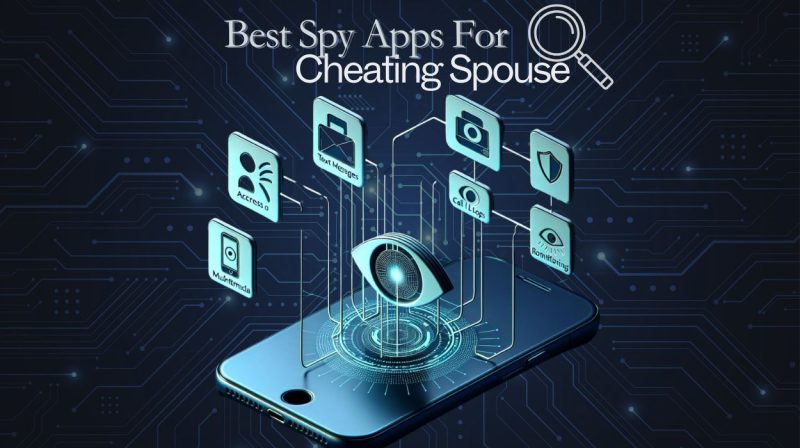









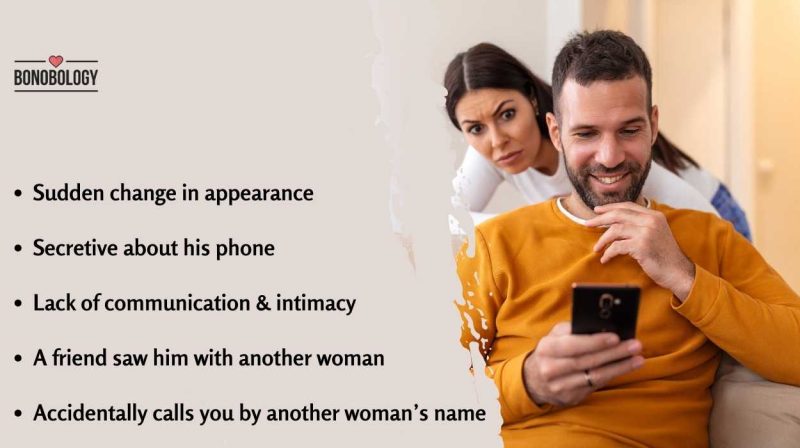
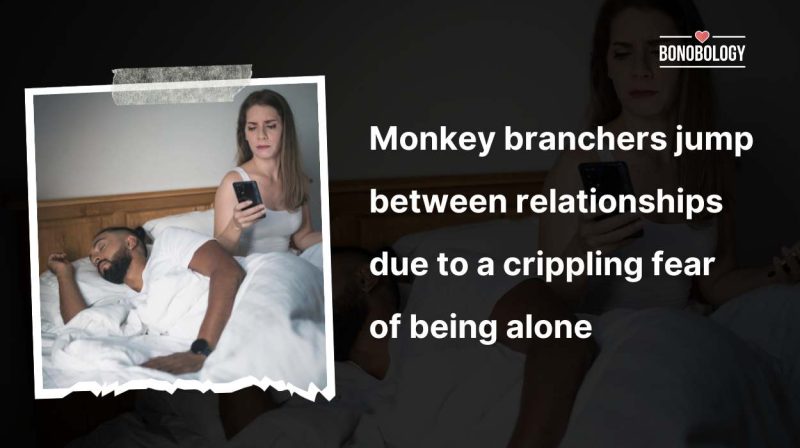

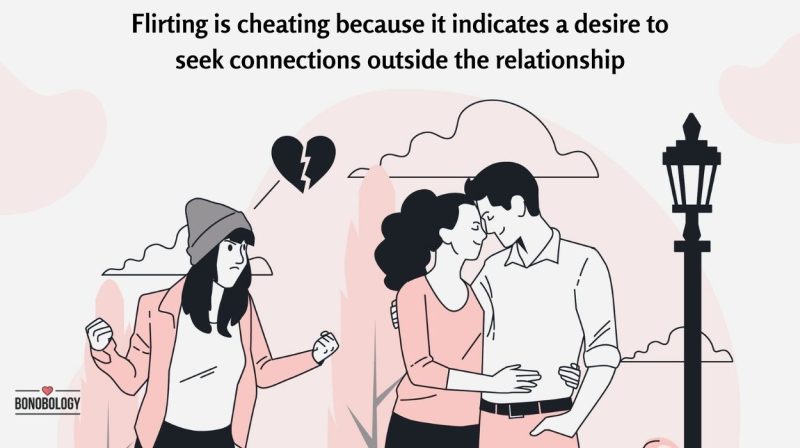



Featured
Evli Bir Erkeğin Size Aşık Olduğunu Gösteren 12 İşaret
11 Apps for Cheating Husbands—Catch Him Red-Handed
When Do Cheaters Realize They Made A Mistake? 10 Scenarios
5 Best Cheating Spouse Tracker Apps (Android & iPhone)
How To Catch A Cheater That Deletes Everything: 12 Hacks
33 Signs Of Micro-Cheating — Is Your Partner Guilty Of These?
7 Therapist-Approved Things To Do If Your Boyfriend Is Cheating On You
11 Heartbreaking Signs Your Husband Misses His Affair Partner
Should You Forgive A Cheater? 8 Factors To Consider
How Can You Tell If Your Fiancé Is Cheating? 15 Signs To Look Out For
Is Marriage Never The Same After Infidelity?
13 Uncommon Signs of Cheating People Wish They Hadn’t Ignored
15 Cell Phone Cheating Signs That Confirm Infidelity
Gut Feeling He’s Cheating, No Proof? 31 Signs Your Instincts Are On Point
Monkey Branching: Meaning, Signs, And Ways To Deal
Painful Message To A Cheating Boyfriend: 50 Brilliant Ideas
Is Flirting Cheating? 9 Reasons It Is And 7 Ways It Can Harm Your Relationship
What To Do If You Suspect Your Husband Is Cheating But Have No Proof
Understanding Post-Infidelity Stress Disorder – Signs and Recovery Tips
15 Signs Your Husband Is Cheating On You With A Coworker